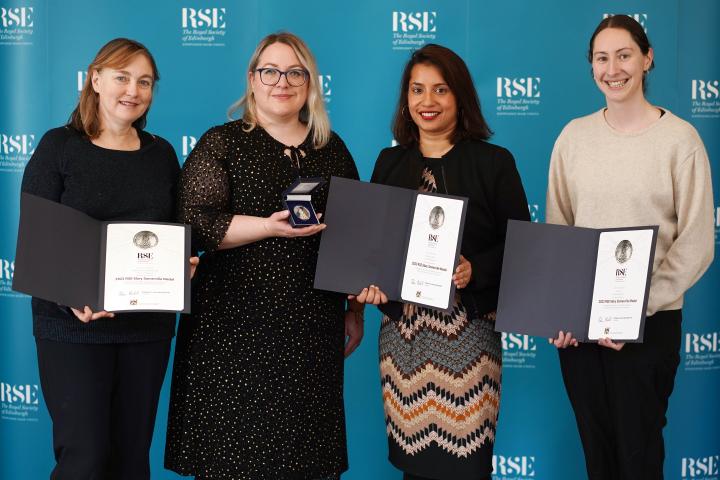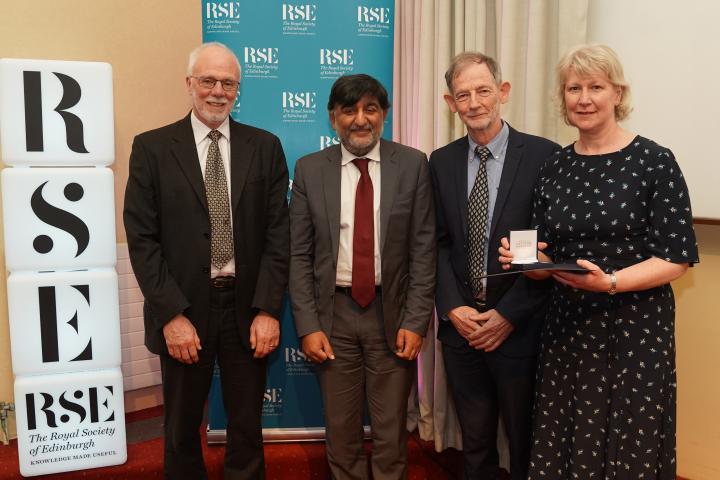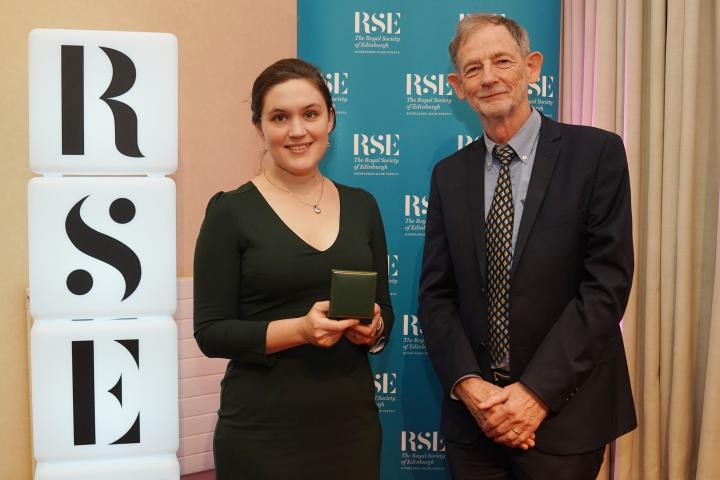A group of Edinburgh academics whose research has shed light on global questions have been honoured by the Royal Society of Edinburgh.
The Peace and Conflict Resolution Evidence Platform (PeaceRep), a consortium of research and non-governmental institutions led by the University, has been commended for its work in supporting peace processes across the globe.
EAVE II, based at the Usher Institute, has been recognised for its work in developing a data resource that monitored and forecast the Covid-19 pandemic as it evolved in Scotland.
Both teams have received the Royal Society of Edinburgh's (RSE's) Mary Sommerville Medal, an award for excellence in teamwork and collaboration in research.
Collaborative research
Elsewhere Dr Lara Kalnins received the RSE's Rosemary Hutton Award for her collaborative work in the Earth sciences, combining data, analysis and modelling to bring new insights into the study of the dynamics of the Earth.
The medals were presented at an event at the Royal Society of Edinburgh.
PeaceRep, which is funded by the UK Government, uses research and big data analytics to help peacemakers learn lessons from previously negotiated peace deals.

The world-leading research has documented more than 2,000 peace agreements signed since 1990.
Peaceful solutions
The data has assisted mediators trying to find peaceful solutions to violence in countries including Afghanistan, Ethiopia, Iraq, Myanmar, Sudan, Syria, Ukraine and Yemen.
Professor Christine Bell, an expert in human rights law leads the team of more than 50 researchers, mediation practitioners, lawyers, data scientists, managers, and communications professionals.
The project includes members at other universities, such as: the Centre for Trust, Peace and Social Relations (CTPSR) at Coventry University; Conflict and Civicness Research Group at London School of Economics (LSE); Middle East Centre at LSE; Queens University Belfast; University of St Andrews; University of Stirling, as well as international organisations Conciliation Resources and International IDEA, and local research partners in case study countries.
At a time when the world seems perilously engaged in war, this medal affirms the importance of continual peacemaking in dark and dangerous moments. The award of the medal will encourage us, and we hope others, to continue to explore how new technologies can be used to harness innovation in research and practice.
EAVE II used patient data to track the Covid-19 pandemic and the effect of interventions such as vaccines in near real-time across Scotland

The team created a rich data platform of all 5.4 million people registered with a GP in Scotland, around 98 percent of the Scottish population.
This generated evidence and analyses that supported the policy and public health response throughout the Covid-19 pandemic.
EAVE II comprises of an interdisciplinary team of public health experts, academics, data scientists and public members across Scotland.
Researchers at the University of Edinburgh lead the study in collaboration with Public Health Scotland and the Universities of St. Andrews, Strathclyde, and Aberdeen.
It was an incredible privilege to work with our interdisciplinary Scotland-wide team of academics and professional services staff, public health and clinical experts, and our fantastic patient and public involvement group to help answer some of the most important scientific questions in the world at the time. I very much hope that our expert team will be able to build on these pandemic experiences, using our outstanding health data assets, to help address other pressing issues facing our NHS and through so doing improve health outcomes for the people of Scotland and beyond.
Dr Lara Kalnins' research uses a combination of geology and geophysics to understand how the Earth's solid tectonic plates and flowing mantle interact to create the many and varied patterns of volcanism seen at the surface

.
The research looks at what those patterns can tell us about how the plates and mantle convection change through time.
Dr Kalnins has been working recently on the volcanic puzzle of The Tasmantid Seamounts and the Lord Howe Seamounts in the Tasman and Coral Seas, east of Australia.
The existence of these three parallel lines of dormant volcanoes that span thousands of miles cannot easily be explained by plate tectonics or mantle plumes alone.
I am honoured and delighted to receive the Rosemary Hutton Medal and grateful for this recognition of the potential and power of the integrative style of research I do. My thanks as well to all my collaborators and students - as always, science is a team effort, and I could not have done my part without theirs.
The Royal Society Medals recognise exceptional achievement in research in teamwork and collaborative endeavour within Scottish Higher Education Institutes (HEI), between Scottish HEI and other institutions/businesses, and within other institutions, nationally and internationally.






